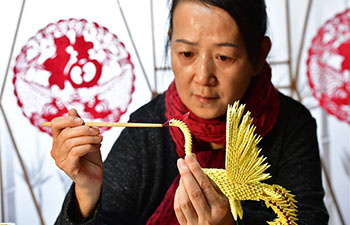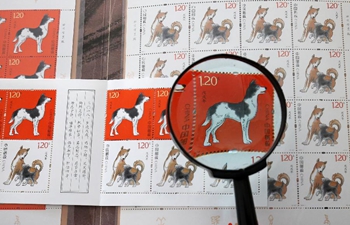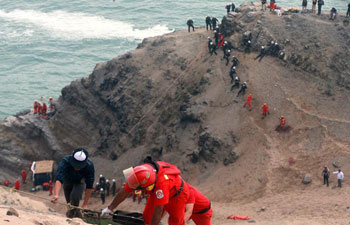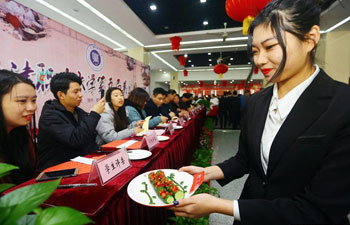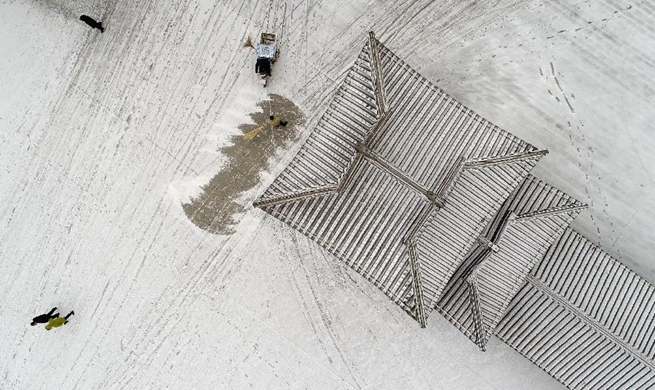by Burak Akinci
ANKARA, Jan. 3 (Xinhua) -- After a year of troubled relations, Tureky and Germany have expressed readiness to improve their ties in 2018, which is a must since "they need each other," said local experts.
The Turkish Foreign Minister Mevlut Cavusoglu said the time has come for Germany and Turkey to return to friendlier relations.
Cavusoglu said he expected relations with Germany to improve in 2018. Turkey had a "good dialogue" with Germany.
"I think both sides are ready to normalize the relations. So I am expecting a much better year in 2018," he said in an interview with the German DPA news agency, published on the first day of the year.
However, the Turkish minister took the occasion to warn Berlin and to insist that if there was going to be a reconciliation, the German side would also have to work towards this vision.
"From our side, we don't see any crisis. Turkey has no problem with Germany. But Germany has a problem with Turkey, and Germany does not miss an opportunity to attack Turkey," he pointed out.
Experts think that it is high time that both sides leave differences aside and start working on mending ties, even if it's not going to be easy.
"We can easily say that in 2017, German-Turkish ties and also Turkish-European Union relations have hit rock bottom," Professor Mustafa Nail Alkan from the Ankara Gazi University told Xinhua.
This prominent expert on Turkish-German relations insisted on the need for the leaderships of both countries to refrain immediately on a bashing rhetoric towards each other which can only be detrimental.
"Warm messages have been delivered in Turkey and Germany. 2018 should be a year to restore the mutual lost confidence in an atmosphere of dialogue," argued Alkan, who pointed out that "Germany and Turkey need each other" since they are major commercial and economical partners.
It was a rollercoaster year in bilateral relations. In February German journalist Deniz Yucel was arrested and jailed on "terrorist" charges, to which Berlin responded as being a "political hostage taking."
But the worst came in April, just before Turkey's constitutional referendum, which granted executive and extensive powers to President Recep Tayyip Erdogan.
German municipalities banned Turkish politicians from campaigning in Germany where there is a strong Turkish diaspora of more than 3 million Turks. The Netherlands followed suit.
Outraged Erdogan, who bashed the West for failing to support its regime after the failed coup of 2016, accused Germany and the Netherlands of "Nazi practices," pushing ailing relations to even worse ground amid strong German criticism about the still ongoing and unprecedented crackdown against suspected coup plotters in Turkey.
Political analysts believe that election campaigns last year in both countries (referendum in Turkey and national elections in Germany) had an escalating effect.
"Both countries have succeeded in scoring points in regards to domestic politics. But since there are no elections planned in Germany and Turkey in 2018, it is a good opportunity to improve relations," said political scientist Alkan.
And the release by Turkey of two German citizens held in Turkey in October and December had a positive effect. Also, journalist Yucel was placed under better detention conditions, another favorable sign.
However the indictment is still not there nearly one year after his incarceration.
There are currently still about a dozen German nationals in Turkish detention.
Meanwhile, Turkey wants Germany to extradite a number of people it says are connected to the coup attempt and the outlawed Kurdistan Workers' Party (PKK).
Cavusoglu lamented an "Erdogan-bashing trend" abroad and said Germany should treat Turkey as an equal partner and, in the context of relationship normalization, the minister called on German tourists to visit Turkey despite political tensions.
Turkey issued a travel warning for Germany, after Germany issued one for Turkey. "Germany should understand this: If Germany moves one step towards us, Turkey will move two steps towards Germany," said Cavusoglu.
The number of Germans visiting Turkey plummeted over the past two years. In the first 10 months of 2015, 5.1 million Germans visited Turkey. During the same time period in 2017, only 3.3 million Germans visited.
As a sign of the warming of the relations with EU, President Erdogan will visit France on Friday in his first visit abroad in 2018, to discuss bilateral and European ties, the Syrian conflict as well as the fight against terrorism.
"We really look forward to this visit. The talks between the two presidents are expected to be comprehensive and aiming at increasing the bilateral dialogue and cooperation in every field binding our countries," a French diplomat told Xinhua.
France is also Turkey's important commercial ally inside the EU. It will be the Turkish leader's first visit to Paris since two years.
In the last days of 2017, Erdogan expressed willingness to improve strained ties with the EU saying that NATO member Turkey is "obliged to reduce the number of foes and increase the number of friends" amid also a series of differences with the United States which has put their "strategic partnership" in jeopardy.
His comments came after recent remarks by German foreign Minister Gabriel and Dutch Prime Minister Mark Rutte, encouraging positive relations with Ankara who is officially negotiating its membership to the European bloc since 2005.
But tension has risen after the botched coup has suspended those talks amid growing concern for democratic standards in Turkey.
"No one inside the EU wants to lose Turkey which on her side should seek to normalize the extraordinary situation stemming from the emergency rule" imposed after the 2016 coup, said EU expert Bahadir Kaleagasi.
"The EU project is an essential component of Turkey's ambitions to become a global player," argued this expert calling on European countries to understand Turkey's sensitivities regarding its ongoing struggle against the Kurdish rebellion and suspected coup plotters who follow U.S.-based Muslim cleric Fethullah Gulen, Turkey's number-one enemy.
Kaleagasi expected that relations with the 28 member bloc could go back to track if Turkey seeks ways of alleviating the scope of the controversial emergency rule until April when the European Commission will publish its next accession report on Ankara's efforts to become a full member.
"In politics, harsh words, even the toughest one can be forgotten, because it all sums up in converging interest and we do have numerous ones with Germany and the EU in general," added professor Alkan.




